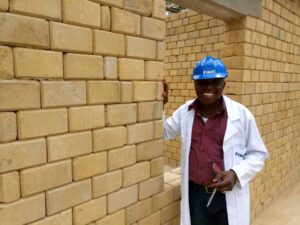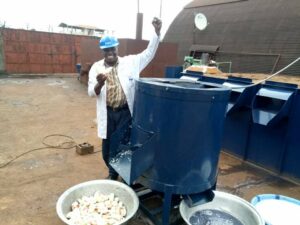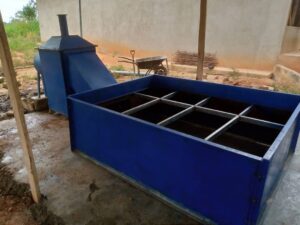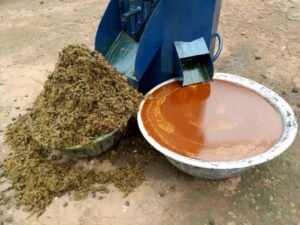Foday Melvin Kamara is the founder and executive director for Fomel Industry & National Industrialization Centre (FINIC Sierra Leone), a company that designs and manufactures agro-processing equipment and uses FINIC made machines to process food such as rice and has created a subsidiary enterprise called CREATE (Centre for Rural Engagement in Appropriate Technology Everywhere). CREATE provides agro-processing services across Africa by putting FINIC machines into use. Foday Melvin Kamara, trained as an automobile engineer, instead of manufacturing vehicles, specializes in turning old car parts into agro-processing equipment and condom machines. With an investment of less than $100 (£63) which he had saved while in Germany. Fomel Industry and National Industrialisation Centre (FINIC), is now worth around $1m

Born in a village called Kasoriya, Sella Limba Chiefdom, Karene District, North of Sierra Leone. Foday Melvin Kamara attended the Wesleyan Secondary School, Kamakwie, and proceeded to be trained in Motor Vehicle Technician at the Government Technical Institute, Kissy Dockyard. Upon completion, he took an appointment as a technical lecturer in the same Institute, a position he held for a few years until he was accorded a bursary for further studies in Automobile Engineering in the Federal Republic of Germany.

Upon graduation, he returned home and was constituted a position as a Training Manager at the Sierra Leone Road Transport Corporation. Part of his responsibilities was to structure the training program to have a practical orientation.
In his tenure, he was privileged to enroll young talented Sierra Leoneans into the training program and that brought him close to brains that he did not know existed before. They showed their talents and resourcefulness, and creativity in what they were engaged in.
Tell us about your company?
“FINIC is an acronym that stands for Fomel Industry & National Industrialization Centre.
Having being exposed to the knowledge of talented youths, it became apparent that such youths should be given a chance to explore their vitalities positively through engagement in some kind of manufacturing. To actualize that dream, I wrote to the management of the Sierra Leone Road Transport Corporation to source funding that could be used to establish an incubation center that can also serve as a placement point for graduates of the institute. My proposal did not receive the attention it deserved and I had to seek other options. Being passionate about mechanical things, I decided to establish FINIC (Fomel Industry and National Industrialization Centre) and had few graduands of Road Transport Corporation Technical Training School serve as Fabrication Technicians.

FINIC officially came into being on the 5th of June 1997. For almost two and half decades, FINIC had been in existence with great contribution to national development through innovations in the design and building of machines that help in the transformation of our agricultural produce into value-added products.”
What inspired you to set up the company?
“The inspiration was drawn by several factors. Key among them is my passion for mechanical things like the Wright Brothers that invented the aeroplane. The others that were also inspirational for the birth of FINIC are the desire to contribute to the reduction of the import dependency and leveraging on the talent base of the country. “
What impact are you making in your country?
“The impact is huge. It is seemingly hidden as Science and Technology are not given a prominent recognition to reflect their importance in national development.
Today, Sierra Leone is among those countries in West Africa leading in the generation of technologies for post-harvest processing. Rice mills, dryers for rice and fruits chips, palm oil equipment, etc. Only those who are stuck in the past will import such agro-processing machines into the country today.
FINIC’S latest invention, the Manual Palm Fruits Digester brand named “Moneh Don” (Poverty Over) is making a serious and huge contribution in changing lives in communities where oil palm is prevalent. The impact is so huge that farmers prefer to make more money by processing their produce using Moneh Don than to sell the fruits to palm oil mills owned by multinational companies.
In the advent of Covid, FINIC designed and invented a highly effective and aesthetic Hands-Free Washing Station to help break the chain of transmission. The invention accelerated FINIC becoming a multi-national Enterprise. After Sierra Leone, FINIC is now fully operational in Ghana and Guinea. In Ghana, the hands-Free Washing station technology is capturing the niche.“
What are the services you offer at Finic Sierra Leone?
FINIC undertakes the design and manufacturing of agro-processing equipment and also uses FINIC made machines to process food such as rice pap etc. Additionally, FINIC has created a subsidiary enterprise called CREATE ( Centre for Rural Engagement in Appropriate Technolgy Everyehere). CREATE provides agro processing services across Africa by putting FINIC machines into use. Unofficially, and in a very small way, CREATE has started operations in Ghana. 
What are the challenges you face?
The challenges are huge as they are multifarious.
Manufacturing in Africa is a tough business. Getting skilled and honest persons, is seriously difficult. Another challenge is access to the requisite materials to conduct our manufacturing operations. Compounding these, is unstable and weak energy supply.

Do you wish to establish this initiative across Africa?
An emphatic yes. FINIC has already expanded to Ghana and Guinea. Plans are ripe to expand to Nigeria.
The immediate chance Africa has to uplift itself from the quagmire of poverty, and distribute wealth to every willing back yard, is Agriculture. A big chunk of the financial input into agriculture goes for machinery. We are talking about opportunities worth billions of dollars floating out there to be grabbed by Africans. When not grabbed, Africans will sail their way across the ocean for either searching for jobs or for importing machines manufactured else where. FINIC will therefore like to be among those grabbing such opportunities and in the process instill the notion that we too, as Africans can. YES WE CAN.








